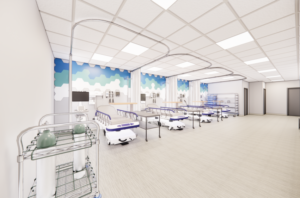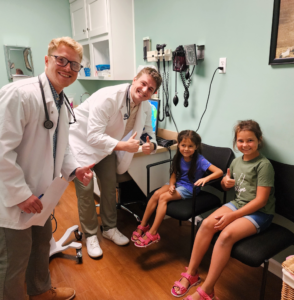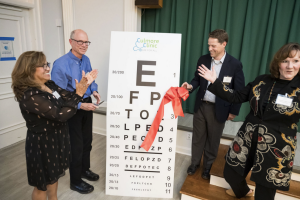By Tony Larson, MD
© 2024 Tony Larson
As a first-year medical student, Hannah Dehoogh-Kliewer wasn’t sure what to expect when she signed up to volunteer at Coyote Clinic. But what began as a simple way to gain patient care experience has blossomed into a passion for helping the underserved.

Since 2006, Coyote Clinic has provided cost-free interdisciplinary medical care to vulnerable populations of Sioux Falls, South Dakota. This population includes, for the most part, those without health insurance. With the peripheral assistance of a few practicing physicians, the clinic is run by volunteer medical students from the University of South Dakota (USD) Sanford School of Medicine.
Although volunteering at Coyote Clinic as a medical student is an excellent opportunity to help the underserved and gain hands-on patient care experience, it can have unforeseen effects—such as cultivating an eagerness to care for the vulnerable. For Hannah, at least, her interactions with her patients at the clinic have planted a seed that has blossomed into an enthusiasm for caring for those who need it most.
“She just moved to the area, was uninsured, unhoused, and had a history of hypothyroidism,” said Hannah while reflecting on one of her most memorable patients from Coyote Clinic. “She had wounds on her skin that hadn’t been cared for. She hadn’t received medical care in six months. She wasn’t doing well. We got her into the clinic, addressed all her health concerns, and helped her find a place to stay. Since then, she’s begun to feel better and is now making several positive changes in her life. This is one example demonstrating how our clinic can provide simple yet impactful care to patients in our community who need it.”
Thriving in her volunteer positions, Hannah’s zeal for helping the underserved has propelled her up the leadership ladder of Coyote Clinic. Now in her third year of medical school, she serves as the chair of the clinic. What started as a 2-hour-per-week time commitment on Tuesday evenings has become an all-encompassing endeavor for her. In addition to her responsibilities as a full-time medical student—which include extended hours on clinical rotations, mastering overwhelming amounts of medical science, and preparing for the grueling process of applying for residency—her role as Chair of Coyote Clinic demands much on top of an already hectic schedule.
“There is already so much to balance in medical school, and my responsibilities as part of Coyote Clinic have grown over the years,” she said. “But we are making an impact in people’s lives that need help, and that makes everything worth it.”
Meeting a Growing Need for Primary Care
Despite the time commitment necessary to keep the clinic running, Hannah, her classmates, and the practicing physicians who staff the clinic know they are desperately needed by the underserved of Sioux Falls. One of those physicians is Dr. Mamoon Ahmed, who juggles his busy internal medicine practice with the additional responsibilities of helping at Coyote Clinic.

Dr. Ahmed, who completed his residency training locally at the USD School of Medicine, reflected on his introduction to Coyote Clinic as an internal medicine resident: “I had many mentors during my residency that encouraged me to help at Coyote Clinic. Residency is busy, and practicing as a physician is busy. But my experience here as a resident impacted me so much that I didn’t hesitate about continuing to help after I finished my training.”
Dr. Ahmed’s enthusiasm for serving the vulnerable coincides with a growing need in the community. As the population of Sioux Falls continues to burgeon, so too does the ethnic and socioeconomic diversity of the area. This, along with a rising prevalence of certain diseases—such as diabetes, hypertension, and hypothyroidism—implies a soaring need for primary care, particularly among those unable to access healthcare.
In addition to treating such diseases, students and doctors at Coyote Clinic also perform free sports physicals for students. Most of these students come from struggling, uninsured families. They would be unable to participate in school sports due to the high costs of obtaining a physical at a traditional clinic.
“Many of our patients have recently immigrated to the U.S., do not speak English, and do not have health insurance,” Dr. Ahmed said. “If it were not for this particular clinic, these patients may not have the opportunity to access any healthcare… Even though the populations we serve make up only 2-3% of the overall population in Sioux Falls, we still get many visits during our clinic nights, and that number has been growing.”
In a healthcare system that promotes and rewards specialized care, the role of primary care is often overlooked. This is particularly true in vulnerable populations who lack access to any care at all. Sometimes, something as simple as a small pill can have a massive impact.
“I’ve seen so many instances of how primary care can make a drastic difference in a patient’s life,” recalls Dr. Ahmed when asked about the importance of the primary care services offered at Coyote Clinic. “I can recall one patient with untreated hypothyroidism who came into the clinic. She was unable to function in her daily life. We gave her levothyroxine, a very commonly prescribed medication for hypothyroidism—a tiny little pill. Three months later, she came back to the clinic, and she was a completely different person. She was able to work and was taking care of her kids again. This is an example of how the cost-free primary care we provide at Coyote Clinic is making a difference in the lives of people who otherwise would not be able to access medical care.”
Stories like this energize Dr. Ahmed to continue serving his patients at Coyote Clinic and help the medical students he works with to become the best physicians they can be.
Inspiring the Next Generation of Doctors
In addition to caring for the vulnerable, USD medical students—who comprise most of the Coyote Clinic staff—are gaining crucial skills to become effective and caring physicians. This experience goes far beyond what is taught in the classroom.

“Often, our first-year medical students in the clinic haven’t seen a patient before they start volunteering in Coyote Clinic,” Dr. Ahmed replied when asked about the benefit that the Coyote Clinic provides its student volunteers. “This offers them a great opportunity to see and interact with patients, practice their physical exam and communication skills, and learn how to diagnose and treat primary care diseases. I let them take the lead…These are their patients, and they are the doctors.”
Because of mentorship from Coyote Clinic physicians like Dr. Ahmed, USD medical students like Hannah find the experience at the clinic worth the extra time amidst their chaotic schedules. Like Dr. Ahmed, she plans on becoming an Internal Medicine physician and has found the mentorship at Coyote Clinic invaluable. This kind of guidance has inspired Hannah and numerous other students to care for underserved populations in their future practices.
“As a more senior medical student now, it is amazing to see younger medical students come in to volunteer,” Hannah said while reflecting on her journey from a young student volunteer to chair of the clinic. “As a first-year student, one is nervous and unsure of themselves. Early in our training, we don’t know much about interviewing a patient, let alone diagnosing and treating diseases… But now, as a third-year student, I feel much more confident in my abilities, and I owe a lot of that to my time at the Coyote Clinic. It’s awesome to see the younger students grow and develop into knowledgeable and caring future doctors who want to help the patients we see here.”
The opportunities granted by Coyote Clinic have undoubtedly increased its popularity among USD medical students; according to Hannah, when the sign-up sheet goes out for volunteers, it fills up in minutes.
Expanding Services, Addressing Social Determinants of Health
Coupled with an escalating need for medical care in the community, USD medical students’ growing desire to volunteer has led Coyote Clinic leaders to look for new ways to expand.

Since its inception 18 years ago, Coyote Clinic has gone from occurring only one night a month to now taking place one night every week. Coyote Clinic now offers psychiatric care to meet the broadening mental health needs of the community, which includes having a board-certified psychiatrist staff the clinic one night per week. Clinic leaders hope to offer additional specialty services in the future.
Beyond expanding the clinic hours and services offered, students and staff are also finding creative ways to help patients with other difficulties that can be detrimental to one’s health. Some of those difficulties include accessing expensive prescription medications, finding adequate housing, and obtaining reliable transportation to and from appointments. Healthcare professionals have recently begun to understand the pivotal role these factors (social determinants of health) can have on well-being.

“Historically, social determinants of health may not have been thought of as having an impact on health,” Hannah said. “But we now know what a big role they play, and we are thinking outside of the box to try and address them for our patients.
“For example, we have set up a program with a local pharmacy that provides our patients with coupons to obtain their medications at no cost. This has been a huge step in helping our patients get the treatment they need and would otherwise not be able to afford.
“In addition, we have established a satellite clinic at a local shelter for those without housing, where we can provide basic services and refer patients to Coyote Clinic. We are also trying to find ways to cover the cost of safe and reliable transportation so our patients can get to their clinic appointments.”
As Coyote Clinic continues to flourish, Dr. Ahmed is hopeful those who support the clinic will continue to see the value the clinic provides the Sioux Falls community: “By addressing the needs of our patients, we are allowing them to function in their normal lives—to work, to go to school, to care for their children—and that makes a huge impact on our community beyond the individuals we are caring for. The Coyote Clinic is a relatively small undertaking for us, but it is huge for our patients.”
Learn more about Coyote Clinic
Read more about the Coyote Clinic in this article from January 5, 2024 from USD: Coyote Clinic Fills a Need, Provides Experience
About the Author

Tony Larson, MD, is a freelance medical writer living in Sioux Falls, South Dakota. He can be reached through is profile on LinkedIn.
.
.
.
Related Articles

With Thousands on the Waiting List, California Free Clinic Aims to Provide Surgery Services
In a first, Lestonnac Free Clinic in Orange County, California plans to offer free operations, starting next year. Story from Direct Relief.

Hope Within Community Health: Providing Physical, Spiritual, and Emotional Support to Those in Need
Hope Within provide primary medical care to around 2500 uninsured low-income residents in Lancaster, Dauphin, and Lebanon Counties in Pennsylvania.

A Clear Vision for Community Care from the Culmore Clinic
The Culmore Clinic, a free health clinic serving uninsured adults in northern Virginia, has realized its long-held dream of adding vision care services for its patients.
